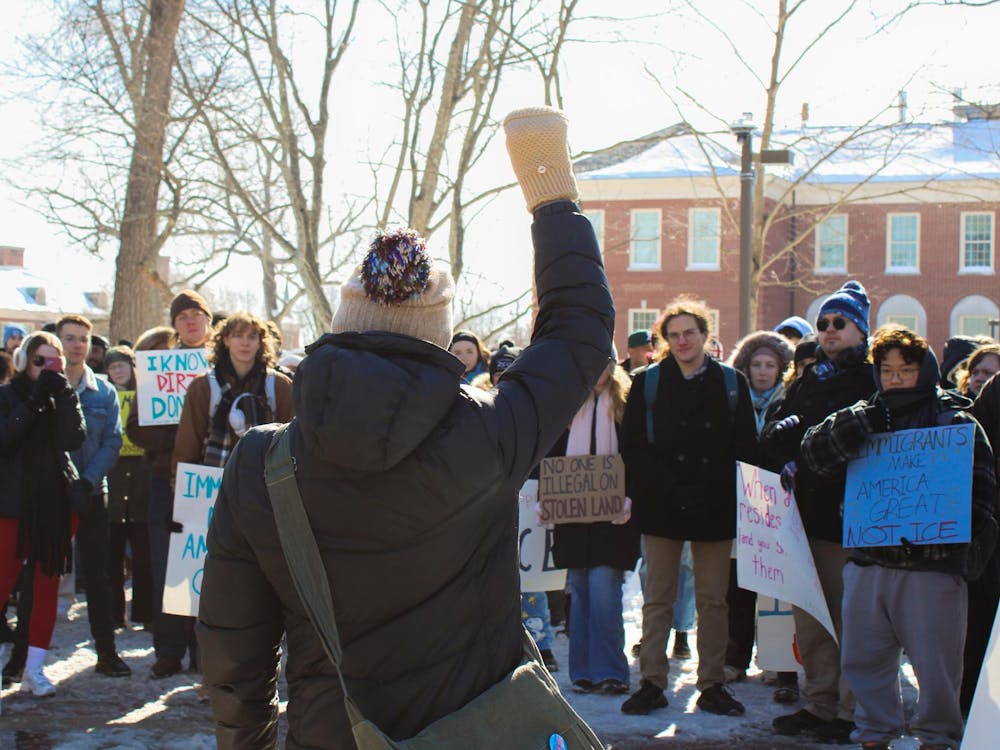Milam's Musings, milambc@miamioh.edu
Unfurl my winter break like a winding country road and roadside attractions would include copious banana pudding, Oscar-movie binging, dog cuddling and God.
Listening, thinking and writing about God occupied large chunks of my time, which may seem odd coming from an atheist.
Then again, it's not when you consider religion is a major area of study, has been around for thousands of years and has courted billions of believers, regardless of their propensity. Which is why I find it odd that believers and nonbelievers often shy away from touching religion.
Perhaps they find it too toxic, a non-starter, or even worse, pointless to examine. I beg to differ, as I find exploring why people believe what they do and that it matters to ask the Big Questions.
My upbringing on this matter was fairly typical, I'd venture to say: I went to Sunday school and the first book I recollect reading was the Children's Bible. However, since my only memory of Sunday school was a man in the church parking lot doing that trick where you pretend you've cut off your thumb, I suppose that best reflects my experience with religion early on.
It never took hold for some reason. For others, it quite obviously does. Curious, indeed.
Then, as it tends to happen with atheism, when I started exploring the Big Questions around age 14, I could be best described as a disciple or caricature of what would become r/atheism. If you're not familiar with that reference; it's essentially the idea that religion exists to be mocked and the religious ridiculed for their stupidity.
Sort of like the George Carlin-variety, "How can you believe this stupid crap?" Of course, he says it more colorfully.
Likewise, another one of the most outspoken nonbelievers and dare I say, most eloquent, was Christopher Hitchens, most known for his book, "God Is Not Great: How Religion Poisons Everything," wherein he says, "The person who is certain, and who claims divine warrant for his certainty, belongs now to the infancy of our species."
While I appreciate Carlin as the greatest comedian of all time and Hitchens for his debating skill -- he's like listening to a symphony with his manifestly skillful wit and humor - I've since moved on from my younger days where I believed the religious to be stupid in their belief and faith.
Believing doesn't make you stupid, but I, nevertheless, do want to challenge people intellectually on their belief - as I would desire to do so on any other manner of belief - and flesh out the theological underpinnings of that belief.
Enjoy what you're reading?
Signup for our newsletter
As for my own, with the ability of hindsight, I now suspect that the reason God and religion never took hold in me at a younger age is the Evil Question, which is among the Big Questions.
The existence of God and the existence of an intervening, caring God are two separate religious and philosophical animals to address. As a note, Christian theology is of importance to me here since I grew up in a Judeo-Christian culture. To which, their theology rests upon the latter proposition.
God sending his only son, Jesus, to die on the cross would appear to be the most important and expressly "caring" of God's interventions and the foundation for Christian theology.
For much of my thinking on Christian theology, I rely on N.T. Wright's wonderfully compelling book, "Simply Christian: Why Christianity Makes Sense," and his other work wherein he says, "Jesus's resurrection is the beginning of God's new project not to snatch people away from earth to heaven but to colonize earth with the life of heaven."
Yet this theology intersects with the Evil Question. To paraphrase Hitchens' argument to Christian apologist, William Lane Craig in their formal debate in 2009, "Where was God during Auschwitz? Looking down with folded arms?"
Craig offered his rebuttal about free will and I'm aware of the thinking therein. Unfortunately, there is not enough space for me to explore the Evil Question in great length or get too knee-deep in the theology here. However, I wanted to at least put on the table one of the bigger roadblocks to faith I have had and continue to have.
I have no answers, but perhaps some advice will suffice: If you're into politics, religion, social issues, try to make an effort to lend your ear to the disagreeable. Not only does it serve to necessarily challenge your own beliefs and therefore strengthen their arguments, but you'll often find, the disagreeable ones present some worthwhile ideas and ways of thinking about issues that you previously hadn't considered.
After all, there is no better time to contemplate God and your existence after that third plate of succulent banana pudding.




